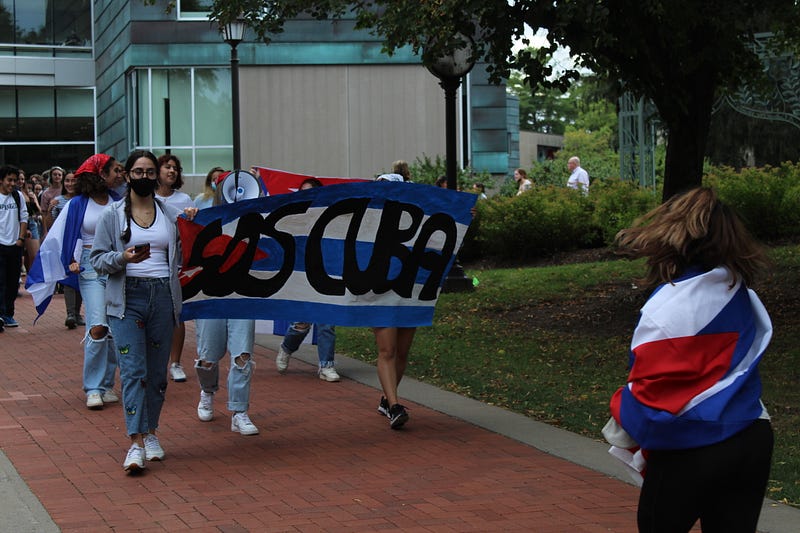
Over 130 students, faculty and staff marched Tuesday, Sept. 21 in an act of solidarity with Cuban civilians. Cubans have been protesting since July 2021 to express dissatisfaction with their current government. Organizers and attendees gathered at Kirner-Johnson (KJ) Circle and marched in a loop around campus. Marchers wore white and blue, clanged spoons against pots and pans and shouted slogans advocating for allyship. Marking the beginning of Hispanic Heritage Month, the S.O.S. Cuba March was organized by Alex Reboredo ’22, Bella Ojeda ’23, Faby Alvarez ’22, Jessica Sanchez ’23, Katelyn Perruc ’23, Tomás Alvarez-Perez ’22 and Yénesis Alvarez ’22.
The idea for the protest began when Yénesis Alvarez asked Ojeda if she wanted to hold a rally in response to the current protests in Cuba. In response, Ojeda told Alvarez, “OK, so let’s make history.” The group of Cuban-American students emailed clubs and organizations abou the event, and 42 of those groups forwarded the march’s details to the student body. Those emails stated that the group was “in solidarity with basic human rights for Cuba” and that “there is no way we can begin Hispanic Heritage Month without raising awareness on what is happening in Cuba.”
Cuba closed its borders for eight months amid the COVID-19 pandemic. This closure caused a resurgence in COVID-19 cases and a slow vaccine rollout. The closure also contributed to an 11 percent contraction of the Cuban economy in 2020. The government’s inaction towards addressing food and medicine shortages pushed Cuban civilians to take to the streets. By demonstrating, Cubans put themselves at risk of being beaten, detained or imprisoned by police. These are the largest protests in Cuba in more than six decades.
Ojeda believes that she and her co-organizers serve as a voice for Cuban civilians, whose internet service has been cut many times by the government as a means of civilian censorship. “I don’t think there’s ever been this amount of representation for us,” Ojeda said, noting the “overwhelming” support, evidenced by the turnout of the march and the conversations the march has created. “I think we’re at a point where it’s really important for us not to be silenced and not to stay silent for our people back on the Island who are silenced every day, all the time. The fact that us group of women came together to make this happen and kind of let our voices be heard for them on this campus is a really big deal.”
When Yénesis Alvarez asked Olivia James ’23 if she could borrow her paint for posters for the march, James said Alvarez taught her about Cuban issues. Being present and listening were important to James, who reflected on the event. “I was asking around what’s happening and then reading the signs because there’s not enough awareness on what’s going on in Cuba,” she said.
Although James was glad that S.O.S. Cuba received a huge turnout, she was still concerned that there is not enough attention on Cuba.“I felt very appalled that there’s still these issues going on and that it’s still OK that they’re going on. I’m confused as to how nobody is really doing anything on a global scale about these issues because these are human rights violations.”
Rachel Araujo ’25 felt proud participating in the march and found that Hamilton differs from her high school in terms of social issues. “In my high school, we never had conversations like this,” she added. “I’m so happy to go to a school where so many people care about situations like this, even though it’s not directly affecting them.”
She also said that she wanted to express her allyship with Cubans. “I have family members back home. Although they’re not from Cuba, they’re from Peru, and they have similar situations. I feel that I’m connected in a way,” Araujo said. Echoing Araujo’s sentiments, Juasline Plasencia ’23, a student ambassador at the Days-Massolo Center, told
The Spectator
that she understands the experience of coming from a country under the oppression of a dictatorship. “I’m trying not to get emotional. I’m sorry, but it’s amazing to have seen [the march] because in Cuba we could have gotten killed for that. We could have gotten arrested, sent to jail and basically wiped off the surface of the Earth just for expressing ourselves and fighting for what is right,” said Plascencia, who is Afro-Latina and whose roots are in Puerto Rico and the Dominican Republic.
She recognized that she has the privilege to protest, which she said that she and other Americans might take for granted, and in turn uses it to express her solidarity with Cubans. “There’s so many other places in the world, and people who are suffering, and we need to continue this energy, and we need to use this experience to continue to fight for Cuba and continue to fight for human rights for the whole world,” Plascencia noted.
Ojeda told
The Spectator
that their goal of having conversations about Cuban issues does not end here with the the march. “We’re going to keep going. This isn’t the last time we’re going to be showing our support and standing up for [Cubans] and using our background and who we are and our privilege in this country to be able to defend them and help them,” she said. “Don’t let the conversation die out.”
















